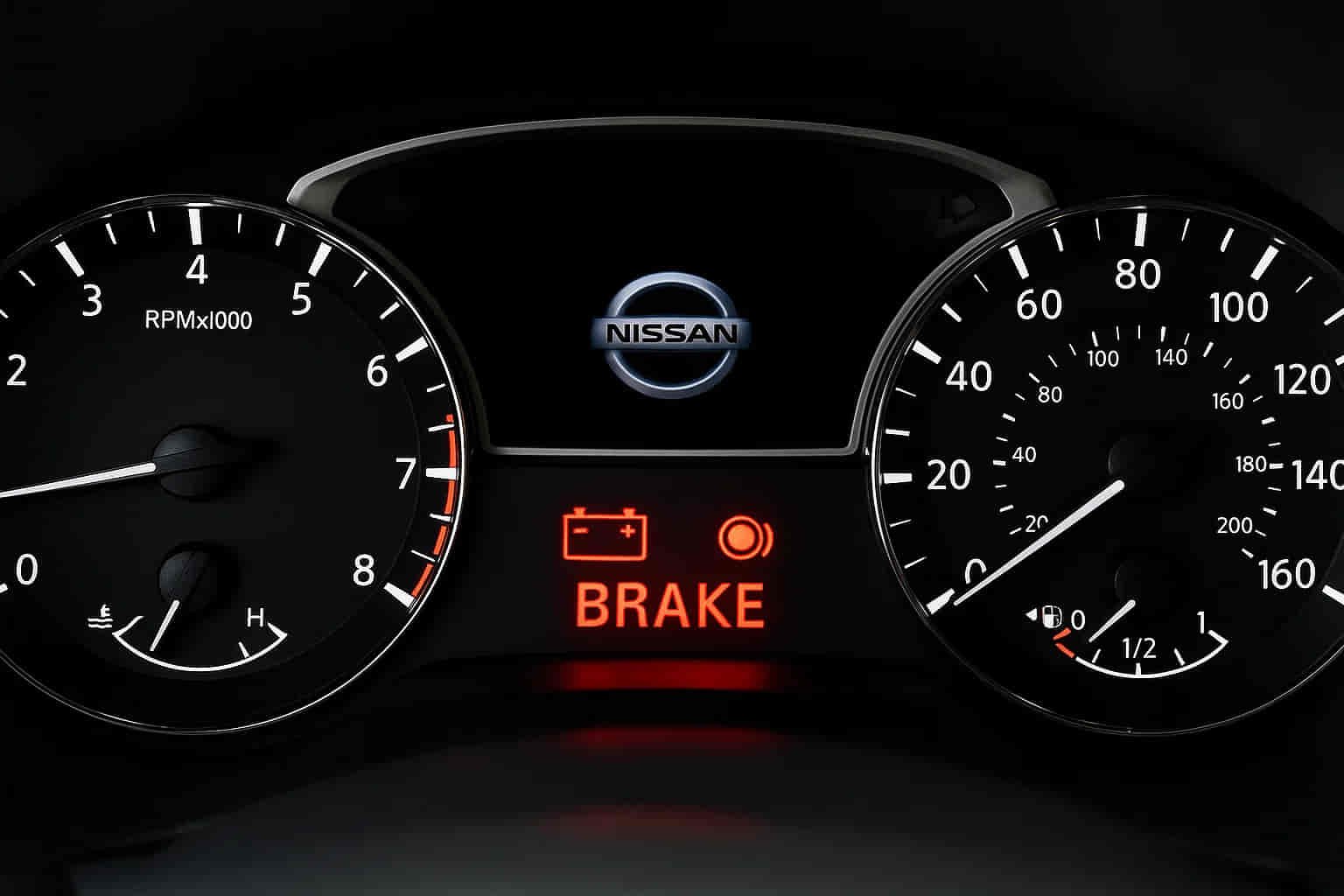You are driving down the road in your Nissan, everything feels normal until suddenly two warning lights appear on your dashboard — the battery light and the brake light. For many drivers, this is a confusing and even frightening situation. Seeing Nissan battery and brake light on at the same time usually means more than a minor glitch; it signals that something in your vehicle’s electrical or braking system needs urgent attention. Ignoring these warnings can lead to your car stalling in traffic, losing power at night, or even compromising your braking performance.
The good news is that this issue is often linked to a few common causes, and in many cases, quick checks or timely repairs can save you from costly breakdowns. In this article, we will uncover the main reasons why these two warning lights appear together, explain what they mean for your Nissan’s health, and provide practical solutions you can apply right away. By the end, you will not only understand the problem but also know exactly what steps to take to keep your car safe and reliable on the road.
Why Both Battery and Brake Lights Come On in a Nissan
When the battery and brake lights come on in a Nissan at the same time, it is not a random coincidence. These two warning indicators are connected through the car’s electrical and charging system. In many Nissan models, the dashboard is designed to illuminate multiple lights when the alternator begins to fail. Since the alternator is responsible for supplying power to both the battery and the electronic components of the braking system, any disruption in its performance can trigger both warnings simultaneously.
This can be confusing for drivers because at first glance it looks like two unrelated issues happening at once. However, in reality, the car is alerting you to a single underlying problem that affects multiple systems. A weak alternator or unstable voltage output can prevent the battery from charging properly while also interfering with the brake warning sensors. That is why seeing both lights together is often the first sign of electrical trouble in your Nissan.
Common Causes of Nissan Battery and Brake Light On
When both the battery and brake lights illuminate in your Nissan, several underlying issues may be responsible. The most frequent culprit is a failing alternator. Once the alternator stops producing a steady flow of electricity, the battery loses its charge and multiple warning systems are triggered at once. Another common reason is low battery voltage, which happens when the battery has reached the end of its lifespan or is struggling to hold a charge.
Brake-related issues can also play a role. If the brake fluid level drops below the recommended threshold, the brake light will activate. In some Nissan vehicles, this warning can appear in combination with the battery light because both systems are linked through the car’s electrical monitoring system. In other cases, faulty wiring, corroded battery terminals, or a blown fuse may be to blame, creating electrical instability that confuses the sensors and results in multiple dashboard alerts.
Understanding these common causes is the first step toward solving the problem effectively. By identifying whether the issue stems from the alternator, the battery, the brake system, or the wiring, you can avoid unnecessary repairs and focus on the component that truly needs attention.
Is It Safe to Drive With These Warning Lights On?
Seeing the battery and brake lights on at the same time is more than just an inconvenience — it’s a potential safety hazard. While you may be tempted to continue driving, it is important to understand the risks involved.
If the battery light is on, it means that your alternator is not charging the battery properly. As a result, your car could lose power unexpectedly, especially if you’re driving for an extended period of time. The vehicle may stall or shut down entirely, leaving you stranded on the side of the road.
The brake light, on the other hand, indicates an issue with the brake system, which is crucial for your safety. Low brake fluid levels or a malfunctioning sensor can trigger this warning. If the brake light is on in conjunction with the battery light, there could be an issue with the electrical connection that affects the braking system’s performance. This makes it dangerous to continue driving, especially at high speeds or in heavy traffic, where quick braking may be needed.
Ultimately, driving with both warning lights on can compromise the vehicle’s ability to stop effectively and may lead to a total breakdown. It’s best to pull over, turn off the engine, and have your car inspected as soon as possible to avoid a more serious situation.
Quick Fixes for Nissan Battery and Brake Light On
If you suddenly notice the battery and brake lights on in your Nissan, there are a few quick steps you can take before heading to a repair shop. The first and simplest check is your brake fluid level. Open the hood, locate the brake fluid reservoir, and make sure the fluid is at the proper mark. Topping it up can sometimes resolve the brake light warning immediately.
Next, examine the battery itself. Look for corroded terminals or loose connections, as these can interrupt the electrical flow and trigger warning lights. Cleaning the terminals and tightening the cables may restore normal operation. If you have access to a multimeter, test the battery voltage. A healthy battery should read around 12.6 volts when the engine is off and 13.7 to 14.7 volts when running. Lower readings suggest the alternator may not be charging the battery properly.
You should also check the fuses related to the charging and braking systems. A blown fuse can cause false alerts or prevent the alternator from functioning correctly. While some of these fixes are simple enough to handle on your own, recurring warnings or sudden power loss indicate a deeper problem. In such cases, scheduling an inspection with a professional mechanic is the safest move.
Repair Costs for Fixing Battery and Brake Light Issue
When both the battery and brake lights are on in your Nissan, the cost of repair can vary depending on the root cause. If the alternator is the problem, replacement usually ranges between $400 and $700, depending on the model and labor rates. This is one of the most common and expensive fixes, but it is also essential, since a failing alternator can leave your car completely powerless.
If the issue lies with the battery itself, the cost is generally lower. A new battery for most Nissan models typically costs between $150 and $300, including installation. On the other hand, topping up or replacing brake fluid is a relatively inexpensive fix, often priced at $70 to $120, unless there is a deeper issue in the brake system.
Electrical repairs such as fixing corroded wiring or replacing a blown fuse can cost between $50 and $200, depending on the complexity of the work. For drivers who are comfortable with basic DIY maintenance, cleaning battery terminals or topping up brake fluid can reduce expenses significantly. However, ignoring these warning lights in an attempt to save money may lead to more severe — and costly — damage in the long run.
Preventive Maintenance Tips
Dealing with the battery and brake lights on in your Nissan can be stressful, but many of these problems can be avoided with consistent maintenance. One of the most effective habits is to schedule regular battery and alternator checks. Testing the charging system at least once a year ensures that voltage output remains stable and prevents sudden electrical failures.
Brake maintenance is equally important. Checking the brake fluid level during routine oil changes can help you catch leaks or fluid loss early. Replacing worn-out brake pads and monitoring the condition of brake lines will also reduce the risk of unexpected brake light warnings.
In addition, simple practices such as keeping battery terminals clean, avoiding short trips that prevent full battery charging, and addressing dashboard warnings immediately can extend the lifespan of your vehicle’s electrical and braking systems. Nissan dashboards are designed to warn drivers before a complete breakdown happens, so ignoring these signals only increases the risk of costly repairs.
By combining regular inspections with quick action when warning lights appear, you can keep your Nissan reliable, avoid roadside emergencies, and drive with confidence knowing your car is in safe condition.
Conclusion
When you see the Nissan battery and brake light on together, it is not just a minor inconvenience but a warning that demands attention. These two lights usually point to problems within the charging system, most often a failing alternator, low battery voltage, or insufficient brake fluid. Left unchecked, the issue can compromise your car’s reliability and even put your safety at risk.
The reassuring part is that once you understand the causes, the solutions become clear. From quick fixes like topping up brake fluid or cleaning battery terminals, to more involved repairs such as alternator replacement, addressing the warning early can save you from unexpected breakdowns and higher repair costs. Preventive maintenance, such as regular system checks and fluid inspections, remains the best way to keep your Nissan in top condition.
So the next time both lights appear, don’t ignore them or assume it’s a glitch. Treat them as your car’s way of asking for help. By acting quickly, you protect not only your vehicle but also your peace of mind every time you get behind the wheel.

